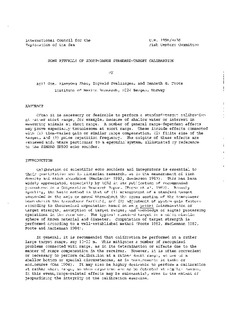| dc.contributor.author | Ona, Egil | |
| dc.contributor.author | Foote, Kenneth G. | |
| dc.contributor.author | Zhao, Xianyong | |
| dc.contributor.author | Svellingen, Ingvald | |
| dc.date.accessioned | 2012-09-25T13:10:39Z | |
| dc.date.available | 2012-09-25T13:10:39Z | |
| dc.date.issued | 1996 | |
| dc.identifier.citation | This report is not to be cited without prior reference to the authors | no_NO |
| dc.identifier.uri | http://hdl.handle.net/11250/105538 | |
| dc.description.abstract | Often it is necessary or desirable to perform a standard-target calibration
at rather short range, for example, because of shallow water or interest in
measuring animals at short range. A number of general range-dependent effects
may prove especially troublesome at short range. These include effects connected
with (1) time-varied gain or similar range compensation, (2) finite size of the
target, and (3) pulse repetition frequency. The origins of these effects are
reviewed and, where particular to a specific system, illustrated by reference to the SIMRAD EK500 echo sounder. | no_NO |
| dc.language.iso | eng | no_NO |
| dc.publisher | ICES | no_NO |
| dc.relation.ispartofseries | ICES CM Documents;1996/B:36 | |
| dc.subject | echo sounder | no_NO |
| dc.subject | ekkolodd | no_NO |
| dc.subject | gear experiments | no_NO |
| dc.subject | redskapsforsøk | no_NO |
| dc.title | Some pitfalls of short-range standard-target calibration | no_NO |
| dc.type | Working paper | no_NO |
| dc.subject.nsi | VDP::Agriculture and fishery disciplines: 900::Fisheries science: 920::Fisheries technology: 924 | no_NO |
| dc.source.pagenumber | 18 s. | no_NO |
